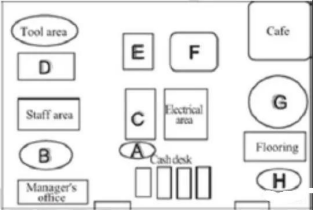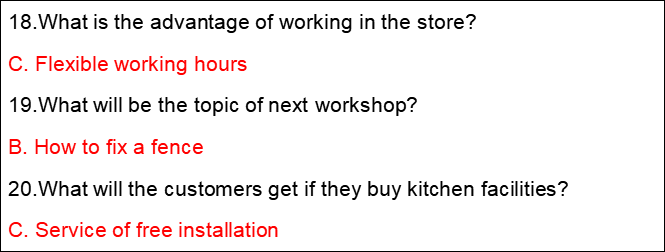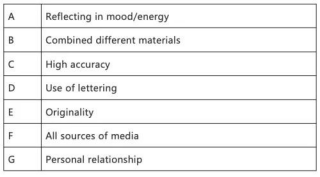2019年07月27号雅思考试回忆内容详解
发布时间:2020-08-27 关键词:2019年07月27号雅思考试回忆内容详解2019.07.27 雅思考试参考回忆
LISTENING
Section1
VersionTopic
新题给孩子报游泳课
1-10 为填空题
1. Name:Rafael
2. suitable for:babies
3. choose:combination
4. Friendship
5. type:smart
6. pool:outdoor
7. membership:family
8. day:Thursday
9. allergic to:Nuts
10. way of receiving:magazine
Section2
VersionTopic
旧题商场的地图和详情

11-15 Mapping
11.Paint Section-bottom left:H 12.Kitchen Section-in the middle:C
13.Children Area-between the cafe and the Paint Section:G 14.Bathroom Section-between the cafe and the Tool Section:E 15.Garden Section-between the Tool Section Staff Area:D
16-20 为选择题
16. Why the store is so popular?
A. Lower price
17. What gift will be given to customers?
B. Magazine

Section3
VersionTopic
旧题art portfolio
21-26 选择题
【版本一】
21. What does Kate want to display most in the Art Portfolio? Development of 那一句
22. What does Parke think can most represent their ideas in the Art
Portfolio?
B. Poster
23. Why does they need to put the pictures of human bodies in the Art Portfolio?
C. Movement
24. What does not Parke put the pictures of desert in it? Need more explanation
25. What aspect does the teacher give them the biggest help?
A. Organization in group
26. Whom else should they seek advice from?
C.Artist
【版本二】
21. What suggestion does Sara get from tutor?
C. Development
22. Charliethink to publize
B. Poster
23. Sara 画人体的想法是=Why does they need to put the pictures of human bodies in the Art Portfolio?
C. needs explanation.
24. Sara 同意 tutor 的哪个观点?
A. Strong impression first
25. What aspect does the teacher give them the biggest help?
A. Organization in group
26.
Whom else should they seek advice from?
D.Artist
27-30 matching

27. Book cover-D
28. The design of jewellery-C
29. The design of wood-curve-E
30. Advertisement-A
Section4
VersionTopic
旧题澳洲文学发展史
31-40为填空题
31. The landscape is described as a character
32. It was mainly spread by early speeches and songs 33.Australia literature theme: friendship
34. It was developed rapidly with the appreance of the publishing industry
35. Each work represents the identity of the author 36.Lawson created a structure and defined Australian
37. the novel"such is life" described the beautiful landscape and the danger in bush.
38. His work named "biography youth" focuses on realism
39. The author experienced poverty which indicates the experience of frustration
40.mainly inspired by coast
SPEAKING
Part 1
People & Animal
Work or studiesHow’s your school? What do you expect your
school to change? Describe your job. Do you
plan to change the company you work for?
Why?
Pet
Do people in your country keep pets now? Why
do you think people choose to keep pets now?
Have you kept a pet when you were a child?
What kind of animal can be a good pet? What
Starskind of animal you don’t want to keep?
Do you like any movie star? Are international
movie stars famous in China? Do you want to be
a movie star? Have you ever met a celebrity in
real life?
Events
TravelWhat kind of cities do you like to travel to? Do
you like travelling?
Visit relativesWhich cities have you travelled to? What is the place that left you the deepest impression when travelling?
What do you do when visiting relative? Why do people visit their relatives? When was the last time you visited a relative? Do you often visit your relatives?
Objects / Things
Tea/coffeeAre these drinks popular in your country? What
drinks do you offer to visitors, tea or coffee?
Math
Do
you
often
use
a
calculator?
Are
girls
generally good at math? Do you think it is
difficult to learn math well? Do you think math is
important?
Perfume
Do you give perfume as a gift? What does
perfume mean to you? What kind of perfume do
Skyyou like? Do you use perfume?
Is there a good place to look at the sky where you live? Can you see the moon and stars at night where you live? Do you prefer the sky in the morning or the sky at night? How often do
you look at the sky?
Places
The area you live Where do you live? How long have you lived in there? Is there anything you like in the area you live in? Can you talk about the people living
around you? What’s the advantage of that area? What can be improved in that area?
Home/Accommo Who do you live with? What kinds of dation accommodation do you live in? Do you live in a house or a flat? What’s the difference between
where you are living now and where you have lived in the past? Can you describe the place where you live? What room does your family spend most of the time in? What do you usually do in your flat? Are the transport facilities to your
home very good? Do you prefer living in a flat or
a house?
Abstract
Weather\season What kind of weather is typical in your hometown? What kind of weather do you like most?
Smile
Can you recognize a fake smile? Do you smile when people take pictures of you? When do people smile at others? Do you like to smile?
Social network
Do you think it is good to make friends online? What are the disadvantages of social networking apps? Why do you use social networking apps? How often do you use social networking applications?
Part 2&3
People & Animal
Describe your favorite singer or band 喜欢的歌手
Describe someone who speaks a foreign language well.说外语好的
人
Describe a foreign celebrity you want to meet in person. 外国名人
Describe a person you have seen who is beautiful or handsome. 俊
男美女
Events
Describe a time that you gave advice to others. 给别人建议
Describe an unusual experience of traveling. 旅游经历
Describe an occasion when you got up early. 早 起
Objects/Things
Describe a piece of clothing you enjoy wearing. 喜欢穿的衣服
Describe an advertisement you remember well. 广 告
Describe a kind of food people eat during a special event. 特定场合食物
Describe an item you bought but do not often use. 少用物品
Places
Describe a historical building you have been to. 历史建筑
Describe a park/garden you like visiting. 公 园
Describe an ideal house. 理想的房子
READING
Passage 1
Topic橄榄油的历史
Content Review
1-6 为判断题
1. T
2. F
3. Not given
4. Not given
5. T
6. F
7-11 为制作类流程图填空
7. Beating olive fruits off trees
8. Adding salt helps to separate oil
9. Placed in bags
10. If discarded directly, the armors may cause pollution
11. Can be used on floors
12-13 填 空
待补充
Passage 2
Topic法律的重要性
Content Review
暂缺
Passage 3
Topic劝导营销
参考原文
A We have long lived in an age where powerful images, catchy soundbites and too-good-to miss offers bombard us from every quarter. All around us the persuaders are at work. Occasionally their methods are unsubtle— the planting kiss on a baby’s head by a wannabe political leader, or a liquidation sale in a shop that has been “closing down” for well over a year, but generally the
persuaders know what they are about and are highly capable. Be they politicians, supermarket chains, salespeople or advertisers, they know exactly what to do to sell us their images, ideas or produce. When it comes to persuasion, these giants rule supreme. They employ the most skilled image-makers and use the best psychological tricks to guarantee that even the most cautious among us are open to manipulation.
B We spend more time in them than we mean to, we buy 75 percent of our food from them and end up with products that we did not realize we wanted. Right form the start, supermarkets have been ahead of the game. For example, when Sainsbury introduced shopping baskets into its 1950s stores, it was a stroke of marketing genius. Now shoppers could browse and pick up items they previously would have ignored. Soon after came trolleys, and just as new roads attract more traffic, the same applied to trolley space. Pro Merlin Stone, IBM Professor of Relationship Marketing at Bristol Business School, says aisles are laid out to maximize profits. Stores pander to our money-rich, time-poor lifestyle. Low turnover products—clothes and electrical goods——are stocked at the back
while high—turnover items command position at the front.
C Stone believes supermarkets work hard to “stall” us because the more time we spend in them, the more we buy. Thus, great efforts are made to make the environment pleasant. Stores play music to relax us and some even pipe air from the in-store bakery around the shop. In the USA, fake aromas are sometimes used. Smell is both the most evocative and subliminal sense. In experiments, pleasant smells are effective in increasing our spending. A casino that fragranced only half its premise saw profit soar in the aroma— filled areas.The other success story from the supermarkets’ perspective is the loyalty card. Punters may assume that they are being rewarded for their fidelity, but all the while they are trading information about their shopping habits. Loyal shoppers could be paying 30% more by sticking to their favourite shops for essential cosmetics.
D Research has shown that 75 percent of profit comes from just 30 percent of customers. Ultimately, reward cards could be used to identify and better accommodate these “elite” shoppers. It could
also be used to make adverts more relevant to individual consumers— rather like Spielberg’s futuristic thriller Minority Report, in which Tom Cruise’s character is bombarded with interactive personalized ads. If this sounds far-fetched, the data-gathering revolution has already seen the introduction of radio— frequency identification—away to electronically tag products to what, FRID means they can follow the product into people homes.
E No matter how savvy we think we are to their ploys, the ad industry still wins. Adverts focus on what products do or on how they make us feel. Researcher Laurette Dube, in the Journal of Advertising Research, says when attitudes are base on “cognitive foundations” (logical reasoning), advertisers use informative appeals. This works for products with little emotional draw but high functionality, such as bleach. Where attitude are based on effect (i.e, emotions), ad teams try to tap into our feelings. Researchers at the University of Florida recently concluded that our emotional responses to adverts dominate over “cognition”.
F Advertisers play on our need to be safe (commercials for insurance), to belong (make customer feel they are in the group in fashion ads) and for selfes— teem (aspirational adverts). With time and space at a premium, celebrities are often used as a quick way of meeting these needs— either because the celeb epitomizes success or because they seem familiar and so make the product seem “safe”. A survey of 4,000 campaigns found ads with celebs were 10 percent more effective than without. Humor also stimulates a rapid emotional response. Hwiman Chung, writing in the International Journal of Advertising, found that funny ads were remembered for longer than straight ones. Combine humor with sexual imagery— as in Wonderbra’s “Hello Boys” ads——and you are on to a winner.
G Slice-of-life ads are another tried and tested methodthey paint a picture of life as you would like it, but still one that feels familiar. Abhilasha Mehta, in the Journal of Advertising Research, noted that the more one’s self-image tallies with the brand being advertised, the stronger the commercial. Ad makers also use behaviorist theories, recognizing that the more sensation we receive from an object, the better we know it. If an advert for a chocolate bar fails to
cause salivation, it has probably failed. No wonder advertisements have been dubbed the “nervous system of the business world”.
H Probably all of us could make a sale if the product was something we truly believed in, but professional salespeople are in a different league—-the best of them can always sell different items to suitable customers in a best time .They do this by using very basic psychological techniques. Stripped to its simplest level, selling works by heightening the buyer’s perception of how much they need a product or service. Buyers normally have certain requirements by which they will judge the suitability of a product. The seller therefore attempts to tease out what these conditions are and then explains how their products’ benefit can meet these requirements.
I Richard Hession, author of Be a Great Salesperson says it is human nature to prefer to speak rather to listen, and good salespeople pander to this. They ask punters about their needs and offer to work with them to achieve their objectives. As a result, the buyer feels they are receiving a “consultation” rather than a sales pitch. All the while, the salesperson presents with a demeanour that
takes it for granted that the sale will be made. Never will the words “if you buy” be used, but rather “when you buy”.
J Dr Rob Yeung, a senior consultant at business psychologists Kiddy and Partner, says most salespeople will build up a level of rapport by asking questions about hobbies, family and lifestyle. This has the double benefit of making the salesperson likeable while furnishing him or her with more information about the client’s wants. Yeung says effective salespeople try as far as possible to match their style of presenting themselves to how the buyer comes across. If the buyer cracks jokes, the salespeople will respond in kind. If the buyer wants detail, the seller provides it, if they are more interested in the feel of the product, the seller will focus on this. At its most extreme, appearing empathetic can even include the salesperson attempting to “mirror” the hobby language of the buyer.
K Whatever the method used, all salespeople work towards one aim: “closing the deal”. In fact, they will be looking for “closing signals” through their dealings with potential clients. Once again the process works by assuming success. The buyer is not asked “are
you interested?” as this can invite a negative response. Instead the seller takes it for granted that the deal is effectively done: when the salesman asks you for a convenient delivery date or asks what color you want, you will probably respond accordingly. Only afterwards might you wonder why you proved such a pushover.
Content Review
选 择 :B A D
匹配:C J F K K D
填空:aisles, experiments, loyalty card, cosmetics, group
Writing
Task 1
Type of
Questions
柱状图
题目 =
图和题目暂缺
Task 2
Topic社会、科技类
Type of
Questions
观点类
题目
Some parents give their children everything that their children ask for or they want to do.Is this good for children? What could be
consequences for these children when they grow up?




